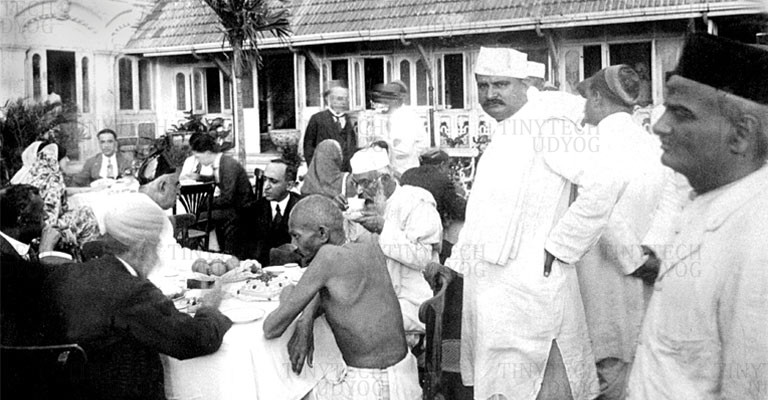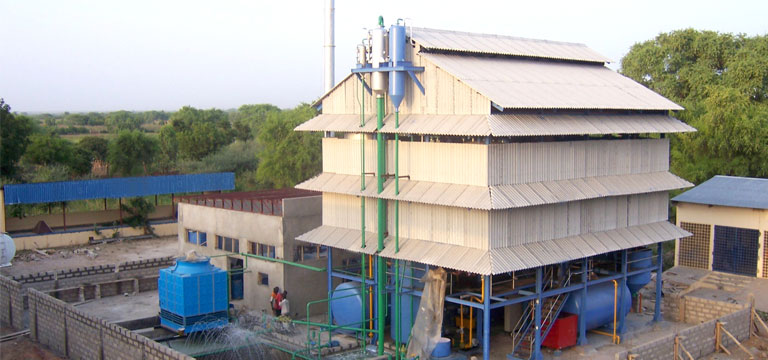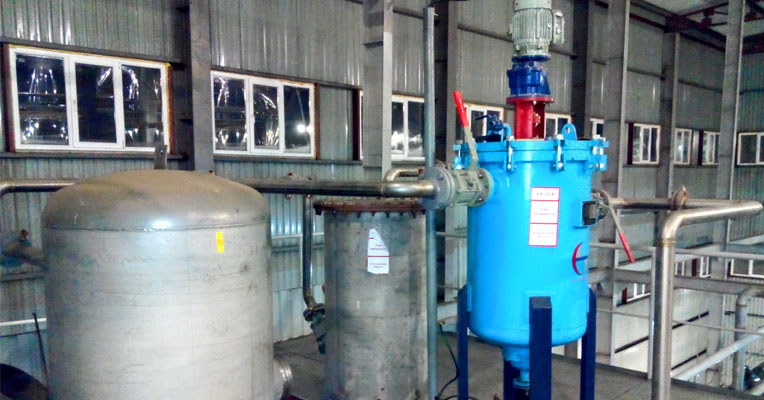Mahatma Gandhi on Industrialization

17 Aug 2018 / Siddharth Jivani  Download Pdf
Download Pdf
- Industrialization is, I am afraid, going to be a curse for mankind. Exploitation of one nation by another cannot go on for all time. Industrialism depends entirely on your capacity to exploit, on foreign markets being open to you, and on the absence of competitors . . . India, when it begins to exploit other nations-as it must if it becomes industrialized-will be a curse for other nations, a menace to the world.
- In the course of a few years the Western nations may cease to find in Africa a dumping ground for their wares. (12-11-1931)
- I do not believe that industrialization is necessary in any case for any country. It is much less so for India. Indeed, I believe that Independent India can only discharge her duty towards a groaning world by adopting a simple but ennobled life by developing her thousands of cottages and living at peace with the world. High thinking is inconsistent with complicated material life based on high speed imposed on us by Mammon worship. All the graces of life are possible only when we learn the art of living nobly.
- There is nothing attractive about it nor is there anything inevitable in it. The future of Industrialism is DARK.
- I claim that to industrialize India in the same sense as Europe is to attempt the impossible. India is one of the few nations of the earth which have witnessed the fall of many civilizations, herself remaining scathe less. My faith in her ability to solve the economic problem that faces her millions has never been as bright as it is today. (6-8-1925)
- To make India like England and America is to find some other races and places of the earth for exploitation. So far it appears that the Western nations have divided all the known races outside Europe for exploitation and that there are no new worlds to discover. What can be the fate of India trying to ape the West? Indeed the West has had a surfeit of industrialism and exploitation. If they who are suffering from the disease are unable to find a remedy to correct evils, how shall we, mere novices, be able to avoid them? (7-10-1926)
- I know that man cannot live without industry. Therefore, I cannot be opposed to industrialization. But I have a great concern about introducing machine industry. The machine produces much too fast, and brings with it a sort of economic system which I cannot grasp. I do not want to accept something when I see its evil effects which outweigh whatever good it brings with it.
- We want industry, let us become industrious. Let us become more self-dependent, then we will not fellow the other people’s lead so much. We shall introduce machines if and when we need them. Once we shall have shaped our life on non-violence, we shall know how to control the machine.
- Whether such plain living is possible for an isolated nation, however large geographically and numerically, in the face of a world armed to the teeth and in the midst of pomp and circumstance is a question open to the doubt of a septic. The answer is straight and simple. If plain life is worth living, then the attempt is worth making. (1-9-1946)
- God forbid that India should ever take to industrialism after the manner of the West. The economic imperialism of a single tiny island kingdom (England) is to day keeping the world in chains. If an entire nation of 300 millions took to similar economic exploitation, it would strip the world bare like locusts. (20-12-1928)
- Industrialization on a mass scale will necessarily lead to passive or active exploitation of the villagers. Therefore, we have to concentrate on the village being self-contained, manufacturing mainly for use. Provided, there would be no objection to villagers using even the modern machines and tools that they can make and can afford to use. Only they should not be used as a means of exploitation of others. (29-8-1936)
- My own view is that the evils are inherent in industrialism, and no amount of socialization can eradicate them. (29-9-1940)
- I have the conviction within me that when all these achievements of the machine age will have disappeared, our handicrafts will remain; when all exploitations will have ceased, service and honest labor will remain. It is because this faith sustains me that I am going on with my work. (30-11-1935)
- What is industrialism but a control of the majority by a small minority?
- Industrialization is, I am afraid, going to be a curse for mankind. Exploitation of one nation by another cannot go on for all time. Industrialism depends entirely on your capacity to exploit, on foreign markets being open to you, and on the absence of competitors . . . India, when it begins to exploit other nations-as it must if it becomes industrialized-will be a curse for other nations, a menace to the world.
- In the course of a few years the Western nations may cease to find in Africa a dumping ground for their wares. (12-11-1931)
- I do not believe that industrialization is necessary in any case for any country. It is much less so for India. Indeed, I believe that Independent India can only discharge her duty towards a groaning world by adopting a simple but ennobled life by developing her thousands of cottages and living at peace with the world. High thinking is inconsistent with complicated material life based on high speed imposed on us by Mammon worship. All the graces of life are possible only when we learn the art of living nobly.
- There is nothing attractive about it nor is there anything inevitable in it. The future of Industrialism is DARK.
- I claim that to industrialize India in the same sense as Europe is to attempt the impossible. India is one of the few nations of the earth which have witnessed the fall of many civilizations, herself remaining scathe less. My faith in her ability to solve the economic problem that faces her millions has never been as bright as it is today. (6-8-1925)
- To make India like England and America is to find some other races and places of the earth for exploitation. So far it appears that the Western nations have divided all the known races outside Europe for exploitation and that there are no new worlds to discover. What can be the fate of India trying to ape the West? Indeed the West has had a surfeit of industrialism and exploitation. If they who are suffering from the disease are unable to find a remedy to correct evils, how shall we, mere novices, be able to avoid them? (7-10-1926)
- I know that man cannot live without industry. Therefore, I cannot be opposed to industrialization. But I have a great concern about introducing machine industry. The machine produces much too fast, and brings with it a sort of economic system which I cannot grasp. I do not want to accept something when I see its evil effects which outweigh whatever good it brings with it.
- We want industry, let us become industrious. Let us become more self-dependent, then we will not fellow the other people’s lead so much. We shall introduce machines if and when we need them. Once we shall have shaped our life on non-violence, we shall know how to control the machine.
- Whether such plain living is possible for an isolated nation, however large geographically and numerically, in the face of a world armed to the teeth and in the midst of pomp and circumstance is a question open to the doubt of a septic. The answer is straight and simple. If plain life is worth living, then the attempt is worth making. (1-9-1946)
- God forbid that India should ever take to industrialism after the manner of the West. The economic imperialism of a single tiny island kingdom (England) is to day keeping the world in chains. If an entire nation of 300 millions took to similar economic exploitation, it would strip the world bare like locusts. (20-12-1928)
- Industrialization on a mass scale will necessarily lead to passive or active exploitation of the villagers. Therefore, we have to concentrate on the village being self-contained, manufacturing mainly for use. Provided, there would be no objection to villagers using even the modern machines and tools that they can make and can afford to use. Only they should not be used as a means of exploitation of others. (29-8-1936)
- My own view is that the evils are inherent in industrialism, and no amount of socialization can eradicate them. (29-9-1940)
- I have the conviction within me that when all these achievements of the machine age will have disappeared, our handicrafts will remain; when all exploitations will have ceased, service and honest labor will remain. It is because this faith sustains me that I am going on with my work. (30-11-1935)
- What is industrialism but a control of the majority by a small minority?





